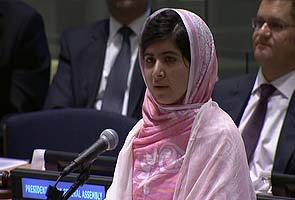I remember that there was a boy in our school who was asked by a journalist, “Why are the Taliban against education?” He answered very simply. By pointing to his book he said, “A Talib doesn't know what is written inside this book.” - Malala Yousufzai
A weekend day in Ramadan can be very slow when you're living in a part of the world when most people observe the fast. Often you end up watching TV, reading or getting your spring cleaning done (in the summer).
So on a lazy Friday afternoon, I was flipping channels on my TV when Malala Yousufzai was about to address the youth wing of the United Nations. Sitting in to listen to her was the United Nations Secretary-General, Ban Ki-Moon and ex-British Prime Minister, Gordon Brown who is currently a UN Special Envoy for Education.
 |
Malala Yousufzai at the UN, wearing a shawl belong to Benazir Bhutto.
Image: ndtv.com |
Little did I know how much I would be moved by this sixteen year-old who had just nine months survived a gun shut to her head fired by a Talib. The maturity with which she addressed the audience would put most grown people to shame but after surviving an attack the way Malala did, she's probably reflected and pondered on what the value of her life is and what she can do with it.
There were so many great quotes from Malala's speech and I'd highly recommend you
watch the video on
YouTube if you can or
read the speech in full.
Mother Theresa and Nelson Mandela are the humanitarians that this generation knows best but it is inspiring to know that there is another generation of humanitarians emerging. Malala is just one shining example who managed to give a speech that tore down all the boundaries across religion, culture and other biases we keep in our minds. No doubt she will do more than just give speeches in the future and she may be the reason we see more great humanitarians emerge.
Ramadan is a month of reflection. No matter what your religion is, hearing words like this from Malala, makes you realize how petty we can be and how much more we could be doing. If a sixteen year old girl from the Swat Valley in Pakistan can survive a gun shot and then come back nine months later to speak of what she can do for others who don't have access to education, why can't we make a change?
I was fortunate enough to watch Malala speak yesterday while my seven year old daughter sat at my side. My daughter had a moment when the speech ended when she realized how lucky she is but how many more aren't quite as fortunate as her.
Malala, my blessings are with you in your cause and thank you for showing me what more we can be doing.
I've extracted below a few passages from Malala's speech yesterday but highly recommend you
read or
listen to the full speech.
Dear Friends, on the 9th of October 2012, the Taliban shot me on the left side of my forehead. They shot my friends too. They thought that the bullets would silence us. But they failed. And then, out of that silence came, thousands of voices. The terrorists thought that they would change our aims and stop our ambitions but nothing changed in my life except this: Weakness, fear and hopelessness died. Strength, power and courage was born. I am the same Malala. My ambitions are the same. My hopes are the same. My dreams are the same.
Dear sisters and brothers, I am not against anyone. Neither am I here to speak in terms of personal revenge against the Taliban or any other terrorists group. I am here to speak up for the right of education of every child. I want education for the sons and the daughters of all the extremists especially the Taliban.
I do not even hate the Talib who shot me. Even if there is a gun in my hand and he stands in front of me. I would not shoot him. This is the compassion that I have learnt from Muhammad-the prophet of mercy, Jesus christ and Lord Buddha. This is the legacy of change that I have inherited from Martin Luther King, Nelson Mandela and Muhammad Ali Jinnah. This is the philosophy of non-violence that I have learnt from Gandhi Jee, Bacha Khan and Mother Teresa. And this is the forgiveness that I have learnt from my mother and father. This is what my soul is telling me, be peaceful and love everyone.
Dear sisters and brothers, we realise the importance of light when we see darkness. We realise the importance of our voice when we are silenced. In the same way, when we were in Swat, the north of Pakistan, we realised the importance of pens and books when we saw the guns.


